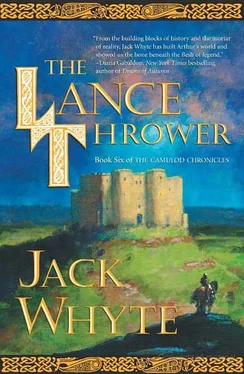Carthac, the monster who had killed him, carried Merlyn’s head back to his camp, swinging it by its long, golden hair as he went. The camp was enclosed and virtually unassailable, high in the mountains and miles from the scene of the fight where the rest of Merlyn’s corpse had been left lying. Carthac had shown Merlyn’s severed head to his whole army, swinging it high around his own head before casting it into a bonfire, where it exploded in a fireball the likes of which no one had ever seen, filling the air with billowing, choking smoke and whirling sparks. And from that cloud of smoke, to the consternation and awestricken terror of everyone who saw it, Merlyn Britannicus had leaped into view, miraculously reborn, to kill and strike the head off Carthac in his turn and send all his followers screaming out into the open air, where they found Pendragon bowmen waiting to shoot them down from the mountain slopes above their camp.
From that day forth, these storytellers said, Merlyn had walked in silence, shrouded in robes of deepest black, and all men shunned him.
That was the people’s version, the tale told in hushed voices throughout the land on dark nights when the wind howled in the distant emptiness beyond the firelight.
The version I had learned from Merlyn’s. friends was very different. The man Carthac had beheaded was actually Ambrose Ambrosianus, Merlyn’s half brother, close enough to Merlyn in appearance to be virtually identical. The two brothers had worked hard to turn that close resemblance into a tactical weapon, cultivating it in such a way that they wore identical clothes and armor and were never seen together. Because they were frequently seen fighting on the same days, but at great distances from each other, the story spread that Merlyn the Sorcerer could win simultaneous victories and be seen triumphant on the same morning or afternoon on two battlefields twenty or thirty miles apart.
On the day when Merlyn was “reborn,” he had penetrated Carthac’s camp disguised as a sick messenger, and he was sitting by the fire pit, nursing a pouch full of some mysterious fire powder. It had been his intention to use the fire powder to create a diversion that would allow him an opportunity to kill Carthac, taking him by surprise in his own camp, by his own fireside, where he least expected any threat. Unaware that Carthac had even met Ambrose, let alone captured him, Merlyn was therefore taken completely by surprise himself by what transpired, and he had barely begun to assimilate what he was seeing when Carthac threw Ambrose’s head into the fire. Then, intent upon recovering his brother’s head before it could take further harm, Merlyn had dashed into the flames, forgetting that he was carrying the bag of his magical fire powder. The powder spilled into the open fire with a terrifying explosion of flames and smoke, and from that cloud Merlyn had emerged in front of Carthac, stunning everyone and stabbing the enemy leader. to the heart before he could react.
Carthac, however, was not to be easily killed. Panicked perhaps by the miraculous reincarnation of a man he had just beheaded, and ignoring the wound in his chest, he scooped Merlyn up and threw him bodily back into the heart of the bonfire from which he had sprung. Merlyn landed flat among the coals and sustained grave injuries, but fortunately—although he himself would come to question that good fortune in the long, exhausting months of rehabilitation that stretched ahead of him—the explosion of fire powder had blown the blaze apart and scattered the fierce-burning branches and bright embers that would otherwise have consumed him completely. As it was, he emerged only slightly disfigured and incapacitated, although his burnt legs ensured that he would never ride a horse again with any ease and would forever afterward walk with a pronounced limp. His left arm and hand, too, were badly damaged, his fingers reduced to little more than claws, and his face, particularly the left side of his mouth, bore scars of what could have been a far more hideous burn. Whenever Merlyn smiled, his mouth was pulled awry on that one side, twisted downward artificially to expose his lower teeth. But then, whenever Merlyn Britannicus smiled, everyone who noticed—and there were very few of those—was invariably glad, because his natural self shone through. The eyes of the people who made up the rest of the world never penetrated the darkness beyond the long, black outer robes he wore, or the hood that overshadowed his face and kept even his eyes concealed from unwanted scrutiny.
This was the man who sat across from me now, the hood of his outer robe pushed back to expose the yellow hair—now showing broad streaks of silver gray—that swept back from a wide, high forehead and keen, deep-set and piercing eyes beneath straight, golden brows.
It was hard not to stare at him, because this man had become a legend and much of the legend had to do with his unseen face, so I was signally aware of the honor he was doing me by allowing me to look upon his face. It was a strong face, but strangely coarse looking, almost as though the skin had undergone some kind of abrasion that had almost broken it. I was dissatisfied with that explanation even as it occurred to me, but I could find no better way to describe it.
The first, ridiculous idea that sprang into my mind upon seeing him was that here was some kind of lion man. I had seen two caged lions, in a traveling entertainment that had visited the Bishop’s School in my second year there, and they had impressed me greatly with their quiet dignity, their strength, and their coloring. Stretched out in the dusty afternoon sunlight on the floor of his cage, and surrounded by chattering, gesticulating boys, the old male, dusky, dusty, and stoic, had crouched motionless, ignoring everyone and everything, his eyes closed in disdain as he contemplated some other reality far removed from where he lay.
Something about Merlyn Britannicus had immediately reminded me of that old lion—perhaps the coloring, I thought at first, but then it struck me that it was the man’s face that had prompted the memory. Merlyn Britannicus’s face was leonine , and that had to do with the curiously roughened quality of his features. His nose was broad and spatulate, beginning between his brows, where it appeared to have thickened and grown flatter, and that general impression of additional and recent thickening persisted all the way down to his mouth, where even his upper lip showed signs of thickening, rather than swelling.
All of these thoughts and impressions flashed through my mind in the space of a moment, but I turned my eyes away quickly when I became aware that my host was watching me watching him . What I did not know, and would not learn for many more years, was that this leonine appearance, caused by a thickening and coarsening of the facial skin, is a primary mark of midstage leprosy.
I was thinking hard about what I hoped to gain from this meeting, but it was plain to me, even as I prepared to ask my own questions of him, that he would tell me little or nothing of what I wanted to know until he had heard all he wanted to hear from me. He sat watching me gravely from the opposite side of the fireplace in his personal quarters behind the Great Hall of Camulod, and the fire in the iron basket had died down to embers, wisps of smoke wafting up between us. There was not much light in the room, though the sun was shining brightly outside, and he sat between me and the only window, effectively placing himself in silhouette. Merlyn Britannicus of Camulod, soldier and warrior, philosopher and leader and, most recently by all accounts, sorcerer and warlock, sat waiting patiently for me to tell him all about something that mattered greatly to him but which barely signified with me at all. I had absolutely no interest in visiting the subject he was most curious about, because I had been living with the outcome of it for months past. I did recognize, however, that I had no option but to get on with it.
Читать дальше









